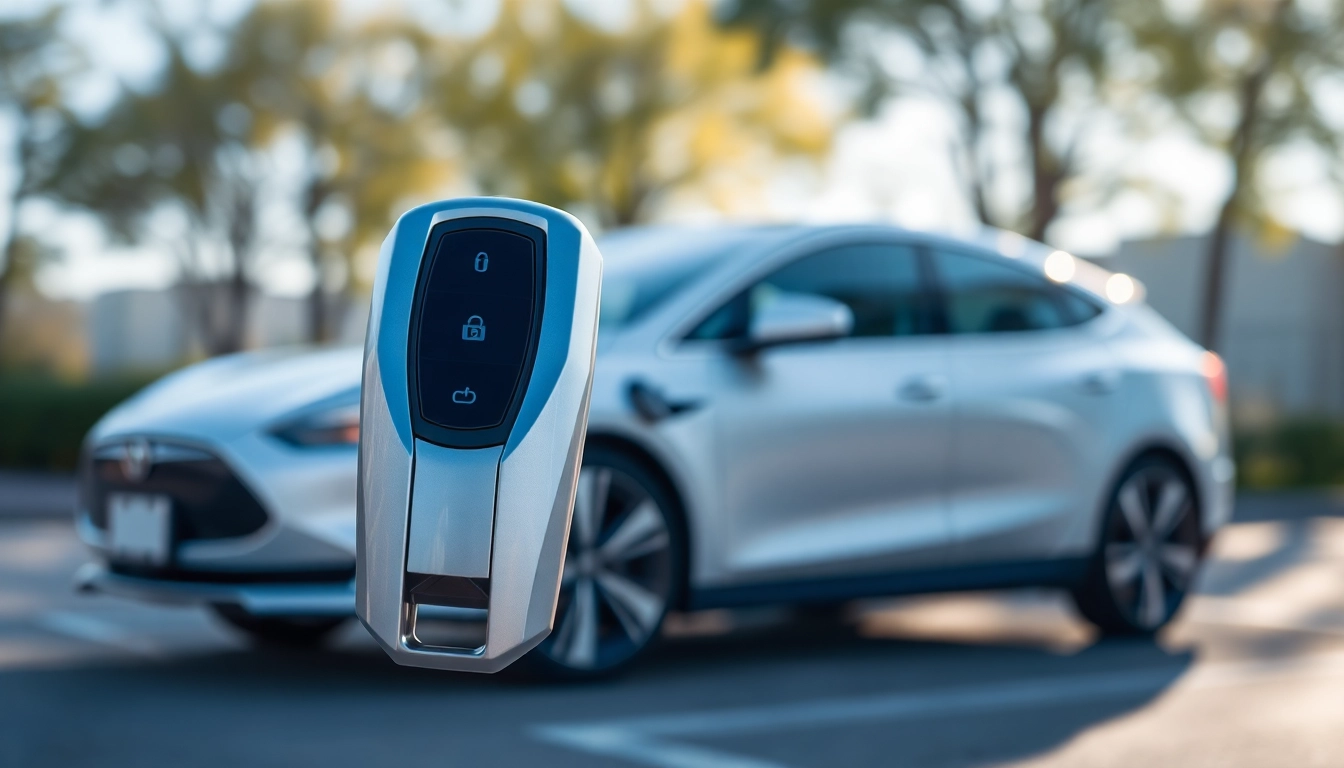
Introduction to Keys for Electric Cars
The evolution of automotive technology has ushered in a new era of vehicle ownership, particularly with the advent of electric cars. As more drivers opt for electric vehicles (EVs), understanding the specific functionalities and features of keys for electric cars becomes essential. Unlike traditional car keys, which often serve a single purpose—unlocking doors and igniting the ignition—electric car keys embody a multifaceted approach that integrates advanced technologies and offers enhanced convenience. In this article, we’ll navigate the landscape of electric car keys, exploring their functions, types, importance, and future trends.
What Are Electric Car Keys?
Electric car keys are specially designed to communicate with electric vehicles, allowing drivers to unlock, start, and control various functions of their cars. These keys replace traditional metal keys with ergonomic technologies such as key fobs, smartphone apps, and even biometric authentication. The primary aim is to enhance user experience by integrating technological innovations while ensuring vehicle security.
Types of Keys for Electric Cars
Electric car keys can generally be categorized into the following types:
- Key Fobs: These are compact devices that provide physical interaction. By pressing a button on the key fob, users can unlock doors or start the vehicle without needing to insert a traditional key.
- Smartphone Apps: Many electric vehicles can be operated via dedicated smartphone applications. These apps allow users to control vehicle functions such as locking, unlocking, and even pre-conditioning their car’s cabin temperature.
- Digital Keys: This technology allows cars to be controlled with mobile devices through Near Field Communication (NFC). A digital key can often be shared with other users easily, facilitating car-sharing scenarios.
- Biometric Keys: While still largely in development, biometric systems could use fingerprints, facial recognition, or other biological markers to unlock and operate vehicles, enhancing security.
Why Electric Car Keys Matter
Electric car keys are not merely functional devices; they encapsulate the intersection of convenience, security, and modern automotive technology. The importance lies in their ability to streamline the user experience while prioritizing safety. As legislators consider regulations surrounding EVs and their charging infrastructure, the innovation surrounding keys can significantly impact user adoption rates. Understanding these keys is crucial for potential buyers aiming to enjoy the full suite of EV features.
How Do Keys for Electric Cars Work?
Digital Key Technology Explained
Digital keys operate through a secure communication system that allows vehicles and devices to “talk” to one another. By utilizing technologies such as Bluetooth and NFC, these keys can detect when a user is nearby and trigger functionalities like unlocking doors or starting the engine. The advantage of digital key technology is its ability to enhance security. Digital keys often incorporate encryption, making it significantly harder for unauthorized users to gain access.
Comparing Fobs and Mobile Solutions
While key fobs remain popular due to their user-friendly nature, mobile solutions are gaining traction. Key fobs offer a tactile method of accessing vehicles, while mobile apps provide a wider range of functionalities, such as remote monitoring and control. The apps can allow users to check battery status, locate the vehicle, and even schedule charging sessions. This increased functionality can be particularly useful in urban environments where parking and vehicle status are constant concerns.
Security Features of Electric Car Keys
Security is a paramount concern in the automotive industry, especially with the rise of connected devices. Electric car keys incorporate several advanced security features, including:
- Encryption: Most digital keys use encryption protocols to encode communications, reducing the risk of hacking.
- Geofencing: Some keys can be programmed to restrict access based on the vehicle’s geographic location, alerting the owner of unauthorized attempts to access the vehicle.
- Two-factor Authentication: Some mobile apps implementing digital keys offer two-factor authentication, requiring users to provide a second form of identification before allowing access.
Benefits of Using Modern Electric Car Keys
Convenience and Accessibility
One of the most notable benefits of modern electric car keys is convenience. Drivers can unlock and start their vehicles without fumbling for traditional keys. Many model variants now offer features such as automatic unlocking when a driver approaches with the key fob, or the capability to start the vehicle with a simple touch of a button. This accessibility not only enhances driver satisfaction but also reduces the time spent entering and starting vehicles.
Enhanced Security Measures
As discussed earlier, the multi-layered security features unique to electric car keys ensure that your vehicle is protected against theft and unauthorized access more effectively than traditional keys. Features like biometric authentication and ongoing software updates significantly reduce vulnerabilities. Regular software updates can address security flaws, making electronic keys a more robust option for vehicle protection.
Integration with Smartphone Technology
The integration of electric car keys with smartphone technology fosters a seamless connection between the driver and their vehicle. This allows for functionalities such as remote starting, unlocking doors, and tracking vehicle location and stats, all managed from a smartphone app. This feature resonates particularly well with tech-savvy consumers and positions electric vehicles as the more desirable options within the automotive market.
Challenges and Considerations
Common Issues with Electric Car Keys
While the innovations in electric car keys present various advantages, they are not without challenges. Common issues include:
- Connectivity Problems: Issues with Bluetooth or app connections can lead to inconvenience, particularly in emergencies where rapid access to the vehicle is needed.
- Battery Failures: Both key fobs and smartphones require battery power for operation. Battery failure can lock users out until they either replace the battery or find an alternative key solution.
Replacement Costs and Services
Replacing an electric car key can be a daunting task, often associated with high costs, especially for advanced key fob models. Costs generally vary depending on the vehicle’s manufacturer and model, but users should budget for this possibility when purchasing an electric car. It’s advisable to consult with a certified automotive locksmith or dealer to understand the specifics of key replacement for any given model.
Potential for Key Fob Malfunction
Like any technology, key fobs and digital keys can malfunction. Issues may arise from electronic battery failure, water damage, or internal technical failures. Users should familiarize themselves with troubleshooting methods, such as reprogramming the key fob or using backup access methods. Awareness of these potential issues can prepare users for any inconveniences, ensuring that they have a backup plan to mitigate any disruptions.
The Future of Keys for Electric Cars
Upcoming Innovations in Key Technology
The automotive industry is actively researching new technologies that could revolutionize key functionalities. Future trends might include further enhancements in biometric security, the use of Artificial Intelligence (AI) to learn driver preferences for tailored access and monitoring, and the expansion of digital keys allowing for a more frictionless driving experience.
The Role of Biometric Security
Biometric security, using unique biological traits for identification, could redefine vehicle access. Featuring advancements such as retina scanning and fingerprint identification, these systems aim to offer unparalleled security and convenience. Imagine a scenario where your car recognizes your presence and unlocks automatically without the need for physical interaction. This future is not far-fetched and could become the industry standard in coming years.
Environmental Considerations and Sustainable Practices
The shift towards electric vehicles is primarily fueled by the need for sustainable practices, and keys are no exception. The future may see a movement towards recyclable materials and sustainable components used in manufacturing keys. Moreover, digital solutions could reduce the environmental footprint associated with key production and distribution.






